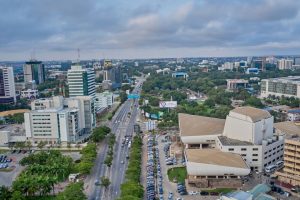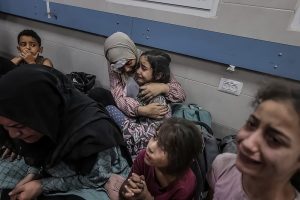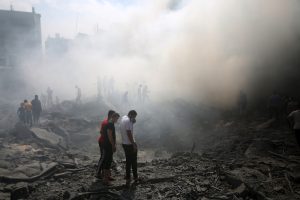
Marwan Sarwar Gill, Argentina
It is often the case that we take for granted, or are not fully aware of, the blessings of being born as Ahmadi Muslims. If I ponder over how Ahmadiyyat was introduced to our family, I feel a deep sense of gratitude to my father, who is the first Ahmadi in our family. But the fact that he joined the Ahmadiyya Muslim Community around 1974 in Pakistan, also reminds me to some extent about the faith-inspiring stories and the circumstances of the early Muslims in Makkah.
In December 1975, (almost one year after the Ahmadiyya Muslim Community was declared ‘not Muslim’ by the Pakistani constitution) the discussions about Ahmadiyyat had also reached the village of Darwali (in the district of Sheikhupura), where my father – belonging to a Sunni Muslim family – had just graduated from school. Due to the ongoing debate about Ahmadiyyat, my father felt great curiosity to find out more information, so he made a few Ahmadi friends from the village and even prayed with them every now and then. One day, as the Ahmadiyya annual convention, known as Jalsa Salana, was fast approaching, they suggested he too attend the convention, which was due to take place in Rabwah. My father immediately accepted the proposal to join the three local Ahmadis, but little did he know that Jalsa in the presence of the Caliph is no ordinary convention!
During the Jalsa, his Ahmadi friends were also performing voluntary duties in the security department. My father also volunteered with them, but as he was a non-Ahmadi, it soon turned into an issue of disagreement amongst the administrators. In these times when the atmosphere in Pakistan for Ahmadis was very tense, a minor mistake or miscalculation could have led to fatal consequences. So understandably, there were worries about trusting my father with this type of task. However, after the president of the Sheikhupura chapter, Chaudhry Anwar Hussain – a prominent figure in the community who knew my father personally – assured the administrators to have trust in my father, they finally permitted him to do so. During the Jalsa neither his friends nor my father were aware that the issue of him serving had been also presented directly to the Third Caliph, Hazrat Mirza Nasir Ahmad (rh).
After the Jalsa concluded, on the 29th of December, the security team had the privilege of shaking hands with the Third Caliph (rh). Despite being unaware of the status of a Caliph, my father could feel that the people around him were quite nervous as they didn’t know how the Caliph would react in regards to the issue about my father. Observing the anxious faces around him had also made my father somewhat nervous. But as soon as he saw the shining face of the Third Caliph (rh) as he stood before him, he immediately felt peace and tranquillity in his heart. The officer of the security department presented my father to the Caliph (rh) with the following words:
‘Jehi wo ladka he’ – meaning that he is that young man (putting these words into context would mean that he is the
same young man who is a non-Ahmadi and had caused the controversy). Upon this, the Caliph (rh), with a smile on his
shining face, replied:
‘Jeh ladka to he hi Ahmadi’ – meaning that this young boy is (already) an Ahmadi.
My father at that time didn’t pay much attention to this statement, as he was just speechless and deeply inspired by the personality of the Caliph (rh). Those few seconds holding his hand and standing in front of his shining countenance had such a deep impact on my father that even today, 45 years later, when my father recalled that precious moment, his eyes started to tear up and I, sitting behind a screen on the other side of the planet in Argentina, could feel the waves of his emotions.
However, after the Jalsa, my father returned home to his village and to his normal routine; but he would soon meet the Caliph (rh) once again.
This time, in a dream the Third Caliph (rh) told my father to perform the bai’at [pledge of allegiance]. With the opposition of his entire family in mind and no apparent support or source of income yet, my father wasn’t feeling ready for this challenge. However, the next meeting with the Caliph (rh) would occur just a few weeks later. It was the beginning of February 1976 and the Caliph (rh) said to my father once again in a dream that he should perform the bai’at – but this time the tone of his voice was more stern. After he woke up, he immediately went to obey the instructions of the Caliph (rh).
Thus, for three years his identity as an Ahmadi was a secret between him and his Ahmadi friends in the village. But in 1979 the time had come for him to disclose his new identity in action and through his practical example. When one of his Ahmadi friends inadvertently told his family that he had already joined Ahmadiyyat, they first tried to convince him and pressurise him emotionally to not betray the traditions of his family and religion. Then this turned into constant verbal insults and attacks against him and the Community. After realising that he was still not showing any signs of weakness, the boycott against him began. Drained by the boycott and fearing that the situation could escalate, my father decided to leave his family and move out. Finally, after six months he was able to return to his family as by then they had accepted that my father would give preference to his spiritual family over his blood-related family. However, it did not end there when my father returned home; rather, over the next 40 years his entire family turned to the true path of Islam by joining the Ahmadiyya Muslim Community. His three younger brothers were the first to join Ahmadiyyat, then finally in 2009, my grandfather, who had previously opposed my father, also accepted Ahmadiyyat. Today, by the grace of Allah, where all the male progeny of my paternal grandfather are blessed to be Ahmadi, it reminds me also of the divine words revealed to the Promised Messiah (as):

‘The (list) of your forefathers will be cut off and (history) will begin with you.’
About the Author: Marwan Sarwar Gill was born in Germany and graduated in 2016 from Jamia Ahmadiyya UK – the institute of modern languages and theology. In 2017 he was posted to Argentina where he is curently serving as an Imam and the national president for the Ahmadiyya Muslim Community there. Marwan is also the co-ordinator for the Spanish edition of The Review of Religions in South America.




Add Comment